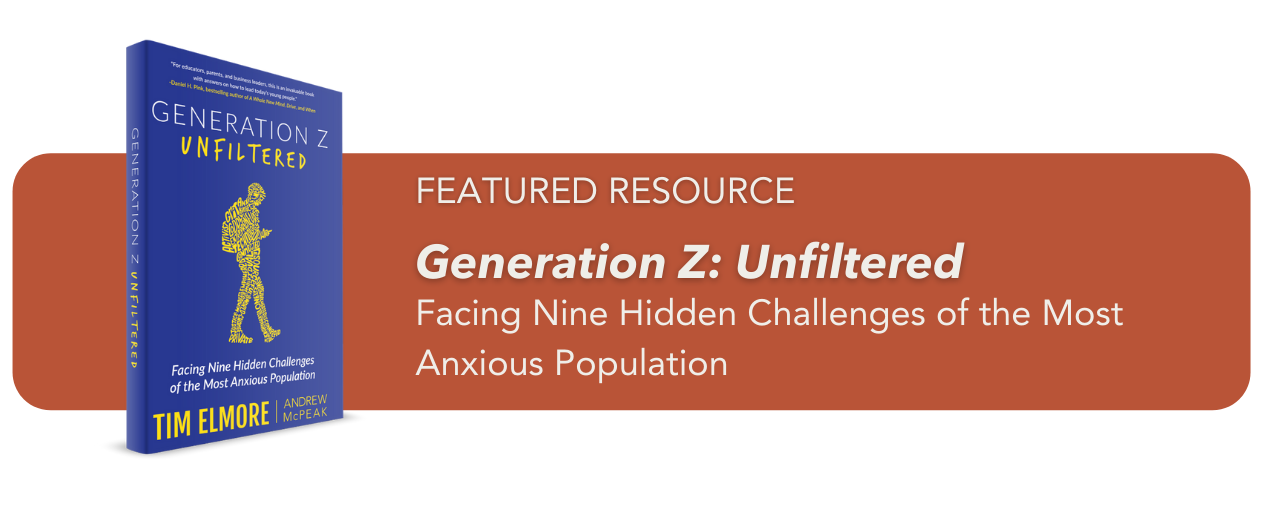
Four Messages Your Freshmen Need To Hear This Year
By: Tim Elmore

Brianna Rivera is an articulate high school student who wrapped her arms around a challenge that teens face today. Finding herself thrust back into society after quarantine, she said, “That’s a lot for me, after having been in isolation for 18 months. You want to get back into the swing of things, but there’s something kind of holding you back. It’s like, you’re having to reconcile these three people—the person you were before the pandemic, the person that you were during the lockdown, and the person that you’re becoming now.”
This reality is especially affecting first-year students nationwide.
The Kids Are Not OK
I’m not sure what you’re observing in your school or district, but nationwide, we see a trend. In fact, there are specific trends with first-year students in middle school and high school. Having learned in isolation for much of the last two years, many are stepping onto their current school campus for the first time. And it’s been challenging for them. In a 2021 focus group hosted by my colleague, Andrew McPeak, teachers and administrators acknowledged that they see a lack of interpersonal skills in the freshmen; there is lower self-awareness and resistance to participation with their teachers. Below is what educators reported as they observed their students.
One principal said students are not as connected to their school as past student populations and current tenth graders are reverting to behaviors and executive functional skills by one to two years. They look like ninth graders. Over half act more like eighth graders. Parents seem to lack the acumen to lead their children through this stunted growth.
One superintendent reported a high rate of absenteeism and apathy among students. There is a quiet indifference. A high number are disengaged in the classroom, and some are even toxic.
Teachers from a number of districts reported that students are literally not turning in major essays, to the point that they’ll fail to pass the course. There is a lack of following directions in both online and in-person classes.
One counselor said students are mad because they feel everything has been pushed back to normal but they do not feel ready for normal. They complain they had no transition time. Teachers are disappointed in the poor social skills and immaturity of the teens. They see more physical fights among students on campus. Students are tapping out on issues that in past years students would have been able to easily overcome.
A high school teacher reported seeing an emotional fragility in students. They have an inability to handle mistakes and do not know how to recover from them. “In our small school of 500, we had five students hospitalized this year for suicidal ideation.”
Will Parker, who serves as the executive director of Oklahoma’s Association of Secondary Principals and Oklahoma’s Middle Level Educators, reported, “I’ve noticed some students who wear masks now even when they’re outside and alone. It’s almost become a safe place for them to hide.”
The Need of the Hour
If you’re seeing what we’re seeing, then we must act. There are consistent messages these first-year students need to hear from you. I’m not pretending that these messages will work like a magic wand, simply that we must help students change their internal narrative, to believe they have it in them to make it through this strange time. Past generations have endured Great Depressions, pandemics, and World Wars. Here are four messages I believe students need to hear from their teachers and parents:
1.I’ll give you my empathy if you’ll give me your effort.
Often, students must be reminded that this strange time isn’t fun for anyone. Teachers are human too, and both students and faculty will need to agree upon a trade-off: empathy for effort. I suggest you even articulate this trade-off. “I will extend to you compassion and grace on your assignments if you extend to me your very best effort.” Both must agree upon a social contract in order to make it. When one party extends what they promise, the other party must reciprocate.
2. In today’s world, your attitude is as important as your aptitude.
Time will tell how this pandemic will affect grades and outcomes as students
graduate. One truth, however, seems sure. A student’s mindset as they endure
a second full year of COVID-19 will make a greater difference than their smarts. Certainly, we must encourage good grades, but senior citizens who grew up in the Great Depression will tell you it was their attitudes that enabled them to thrive.
3. You must trade being fragile for being agile.
Fragile and agile are antonyms. Fragile implies something is delicate and breakable. Agile implies something is adaptable and pliable. Ask any pediatrician and he or she will say kids are naturally resilient, at least most of them. We are the ones who unintentionally make them fragile because we treat them as fragile. We must convince them they can bounce back and adjust to the new normal in which we find ourselves. Why not make agility a core value of your school?
4. You are strong enough to flourish, not flounder.
Too many students languish because every message they consume (especially on social media) tells them life is awful and we shouldn’t expect much of ourselves. Too often, it is memes that shape their worldview, not great role models. Teens need to hear a chorus of messages from caring adults–all singing in unison–that they have what it takes to rise to the occasion. They can flourish, much like their grandparents or great-grandparents did in the difficult times of their childhoods.
Gary Davison, principal of Lambert High School in Georgia, said his student body was languishing; many of the freshman and sophomores were negative. As a coping mechanism, loads got caught up in the latest TikTok challenges. People and property were damaged by students who felt it was entertaining. Administrators called a meeting between faculty and students to discuss the dilemma. They turned the TikTok challenges on their ear by flooding the platform with positive ones, challenging students to encourage each other and to focus. It made a huge difference in the campus’s climate. It was the students, however, who stepped up to influence their peers.
They moved from languishing to leading. That’s the message they must hear.







